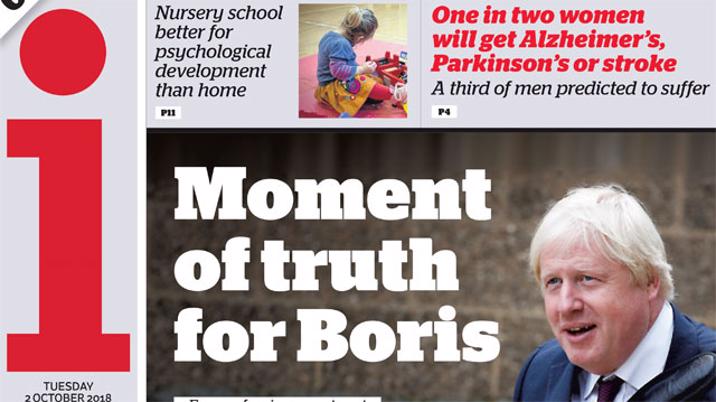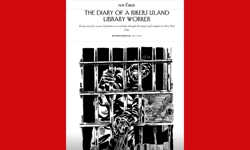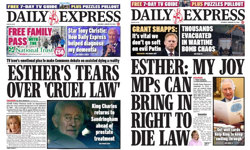
Say ‘Boris’ and everyone immediately knows who you’re talking about. Say ‘Johnson’ and it could be almost anyone – particularly during the EU referendum campaign when Alan was as important to the Remain side as Boris was to the Leavers.
Looks odd, doesn’t it, that bald ‘Alan’ in the middle of the sentence? Yet ‘Boris’ seems completely natural.
Why is it that normal rules don’t apply to this particular politician? Because of his larger-than-life image? His carefully cultivated ramshackle persona? Or simply because he’s the only Boris in public life?
There’s only one Theresa, but – apart from the occasional bit of solidarity from the whitetops – headline writers don’t use her first name. ‘May’ is shorter, so convention wins all round there. Also, ‘Theresa’ isn’t a name that sings out from the page. It is a strait-laced sort of name, a name popular in the Fifties and Sixties that had a short shelf life. There are ‘Terrys’ and ‘Teris’, but neither is Mrs May’s style. Her public personality doesn’t lend itself to short forms, although The Sun has tried ‘Tezza’ a few times (it works quite neatly when coupled with ‘Jezza’).
Just Boris
Boris is of a different ilk. It’s not just the man or the singularity of the name, but the name itself. There’s just something about Boris – think Karloff, think caricature Russians, think spiders – that has a quality all of its own. Scary to some, comic to others. Just like the man.
And so we all do it. In conversations at home, in the pub, in the office, whether we admire or despise him, we can’t help ourselves. He’s Boris.
But should we do it in print or over the airwaves? Is it healthy or good journalism for a Radio 4 Today programme journalist to talk about ‘Boris’, rather than ‘Mr Johnson’, on second, third and subsequent mentions, as one did when reporting on his activities as foreign secretary? Should quality newspapers be calling him ‘Boris’ in splash headlines?
The Telegraph is, of course, proud to claim him as its own and is happy to give him a megaphone every Monday. Whether that is agenda-setting journalism or propaganda depends on your political outlook, but if you are going to turn your columnist into the subject of your lead story, should there be some attempt at aloofness? If you want to put forward his views as a serious political opinion worthy of note, would it not work better with the more formal ‘Johnson’ than the chummy ‘our boy Boris’ that the use of the forename implies?
It’s not just The Telegraph. The i, which markets itself as a concise “quality” paper, does it. The Guardian does it sometimes, so does The Observer. Yet their style guide counsels against the use of first names virtually anywhere other than in interviews and features where it might “strike the most appropriate tone”. The Independent does it – even though its online incarnation frees it of the constraints of printed headline counts. The Sunday Times does it.
The Times’s approach
The Times doesn’t. We have come a long way since The Times insisted on calling Tony Benn, ‘Mr Anthony Wedgwood Benn’ – headlines that would once say ‘Duchess’ or ‘Prince’ now offer more of a clue as to who they’re talking about with ‘Kate’ or ‘Harry’ – but not so far as to be on first-name terms with politicians the paper is supposed to keep under scrutiny.
In August, there was a short page 2 story headlined “Boris plans rebellion at conference”. For the second edition, it became “Johnson plans rebel speech at conference”. The second was more accurate, but was there also a policy decision to avoid the familiarity of ‘Boris’?
The Times’s style chief Ian Brunskill was unequivocal: “We definitely don't like ‘Boris’. That’s why it would have been changed between editions. Chumminess seems quite wrong. We're not there to help him build his brand or do his PR. We wouldn't refer to any other politician like that. Columnists may call him Boris sometimes, I suppose, if that's what feels right to them in context - but we wouldn't want it in a headline, or in a news report.”
As he says, no other politician gets this treatment – from The Times, or from any of its heavyweight rivals. Neither Mr Johnson’s successor nor the leader of the opposition is ‘Jeremy’, even though readers are hardly likely to confuse the two. ‘IDS’ is still seen as too colloquial for some. Broadsheets never regarded ‘Maggie’ or ‘Hezza’ as interchangeable with ‘Thatcher’ or ‘Heseltine’. But, today, quality newspaper readers must apparently be spared the millisecond of thought required to register who a ‘Johnson’ heading is about, even though they can cope with a surname for everyone else. Boris has become a law unto himself.
What’s in a (nick)name
The tabloids have always given people nicknames – The Sun has almost an entire alphabet of ‘zza’ names. The redtops tend to employ them mostly for instant recognition and brevity, but for the middle market, they convey approval or contempt. The Labour leader is sometimes ‘Jez’ or ‘Jezza’ in the Sun and ‘Jeremy’ to the generally supportive Mirror, but he is never anything but ‘Corbyn’ to the disapproving Mail and Express.
In the early days of the Cameron administration, the whitetops occasionally referred to the chancellor as ‘George’. This might work for a themed Budget splash such as “George slays the dragons” or even “George’s marvellous medicine”, but “George’s pensions revolution” on an inside spread grates. It’s too cosy – and anyway, for Mail and Express readers, ‘George’ generally means the young prince or possibly Clooney. No one in the real world outside Westminster talked about Osborne by his first name.
And, come the referendum, nor did the Mail. The froideur arrived with the start of the campaign and its old friend George became ‘Osborne’, arch-villain of Project Fear. Cameron, the man the paper had worked so hard to put into No 10 (largely by vilifying “Red Ed” Miliband), had never been ‘David’, but now he was mocked with both ultra-familiarity and ultra-formality, as in “Pull the other one Dave” and “Is that it, Mr Cameron?”
Boris transcends all this. He has reached the point, possibly uniquely among politicians, where the single name is used by friend and foe alike as nothing more than an identifier.
Mix and match
This can lead to a bizarre mix of first name-surname headlines, such as “Boris rage at Obama”, “Rage of Boris at Osborne the liar” (he did a lot of raging in the Mail on Sunday) and a whole raft in which “Boris” is pitched against “May”.
The Independent writer John Rentoul mocked one such when The Sunday Times splashed on “Boris vs May – now it’s war” at the start of the Tory conference.
“It’s either Boris vs Theresa or Johnson vs May. This is unforgivable journalism,” he tweeted.
He was rewarded with 48 replies showing the devastating wit and wisdom of Twitter: that ‘Boris’ was a shorter word than ‘Johnson’, that it was instantly recognisable, that dropping the word ‘now’ would have made room for the surname, that there were far worse journalistic sins.
Rentoul knew all that. It was intended as a joke. But, as the author of a book on linguistic style – The Banned List – what did he really think?
“Of course, those are the two shortest, easily recognisable names for the two of them. I was being silly about the inconsistency, which doesn't matter journalistically at all.
“However, a short first name or a snappy nickname does imply approval. I try not to refer to ‘Boris’ in my writing or broadcasting, although ‘Boris Johnson’ is extra syllables. But I think it's acceptable in headlines. Then the need for brevity and clarity outweighs the whiff of approval.
“And any implied familiarity is easily overwhelmed by the rest of the sentence. ‘Boris has said too many racist things in his career’, for example, doesn't really let him off.”
Except that there isn’t a “rest of the sentence” in a 120pt headline.
Martin Fletcher, who has written scathingly of Johnson’s efforts as a Brussels correspondent – which he feels helped to poison Britons’ views of the EU - is less forgiving: “We called him Boris back in the days when he was London’s mayor and our merrymaker-in-chief during the Olympics. It’s time it stopped. There’s nothing funny or likeable about Johnson now. He’s become Britain’s leading demagogue and he’s inflicting huge damage on this country.”
It is, of course, perfectly possible to use ‘Boris’ derisively – just listen to Ian Hislop or Paul Merton say the word – but once serious newspapers and broadcasters put themselves on first-name terms with people they are writing about, can there be any escape from Rentoul’s “whiff of approval”? Fletcher seems to suggest that nicknames are fine for jolly people you like. But, whatever your opinion of the man, was it ever OK to call the mayor, Boris?
The sub-editor view
A straw poll of sub-editors suggests a general disquiet, even though being allowed to use ‘Boris’ makes their lives easier. All felt that the benefit of instant clarity came at the cost of impartiality and most advocated the conventional configuration of surname in headlines with full name followed by ‘Mr Johnson’ in text.
Predictably, those who disapproved of the man were those most disapproving of the use of ‘Boris’. “Enough of promoting a cute cuddly image for him,” said one. Another saw it as a “rare excuse to drop an insult – he doesn’t deserve anything as serious as Mr Johnson”. A third mourned the lack of gravitas among today’s politicians, both in the way they behave and in the way they are treated in the media.
Discomfort about that is not restricted to broadsheet / quality subs. Former Sunday Mirror editor Paul Connew, who has held executive positions across a range of tabloids, thinks everything’s got too pally – for example, the progression that saw the convicted train robber go from ‘Ronnie Biggs’ to ‘Ronnie’ and finally ‘Biggsy’.
“It’s not just the tabs, but broadcasters too – especially daytime TV and chat shows. What we're seeing is the personalisation long around in showbiz extended to politicos.”
He cites the way Max Clifford and Jimmy Savile were invariably ‘Max’ and ‘Jimmy’ on the TV sofas until the sex scandals broke – demonstrating the risks of becoming over-friendly with your subjects.
“Now purportedly serious programmes like Today, Newsnight and Peston increasingly address politicians by first names. It exudes a clubbable cosiness that I think does viewers and listeners a disservice. Call me old-fashioned, but I prefer it when a minister is addressed as Home Secretary or Foreign Secretary and non-ministers are Mr / Ms / Mrs and surname.”
Connew now writes about Trump’s America and confesses to having referred to the president as ‘The Donald’ in his columns, but says he is trying to reform with regard to ‘Boris’. “I've been guilty on air often enough and in print, but now carefully switch to ‘Boris Johnson’ or just ‘Johnson’ when I write about him or refer to him in my Talk Radio gigs or anywhere else I broadcast.”
It’s a habit that’s hard to break. Even the anti-Brexit The New European, which is relentlessly critical of Johnson, calls him ‘Boris’ on the cover.
“It’s a real problem,” says editor Matt Kelly, who is responsible for content across the Archant group, which includes the East Anglian Daily Times and Eastern Daily Press. “Wherever possible, we try to use ‘Boris Johnson’ as using ‘Boris’ lends him an air of friendliness that is wholly undeserved. But it’s not always possible to get his full name in a headline and ‘Johnson’ could be anyone. Perhaps we should try something that is brief, instantly recognisable and accurate. Like ‘Lying Git’.
“The same principle applies to the rest of Archant’s newspapers, but I like to think my editors are much less coarse than I.”












